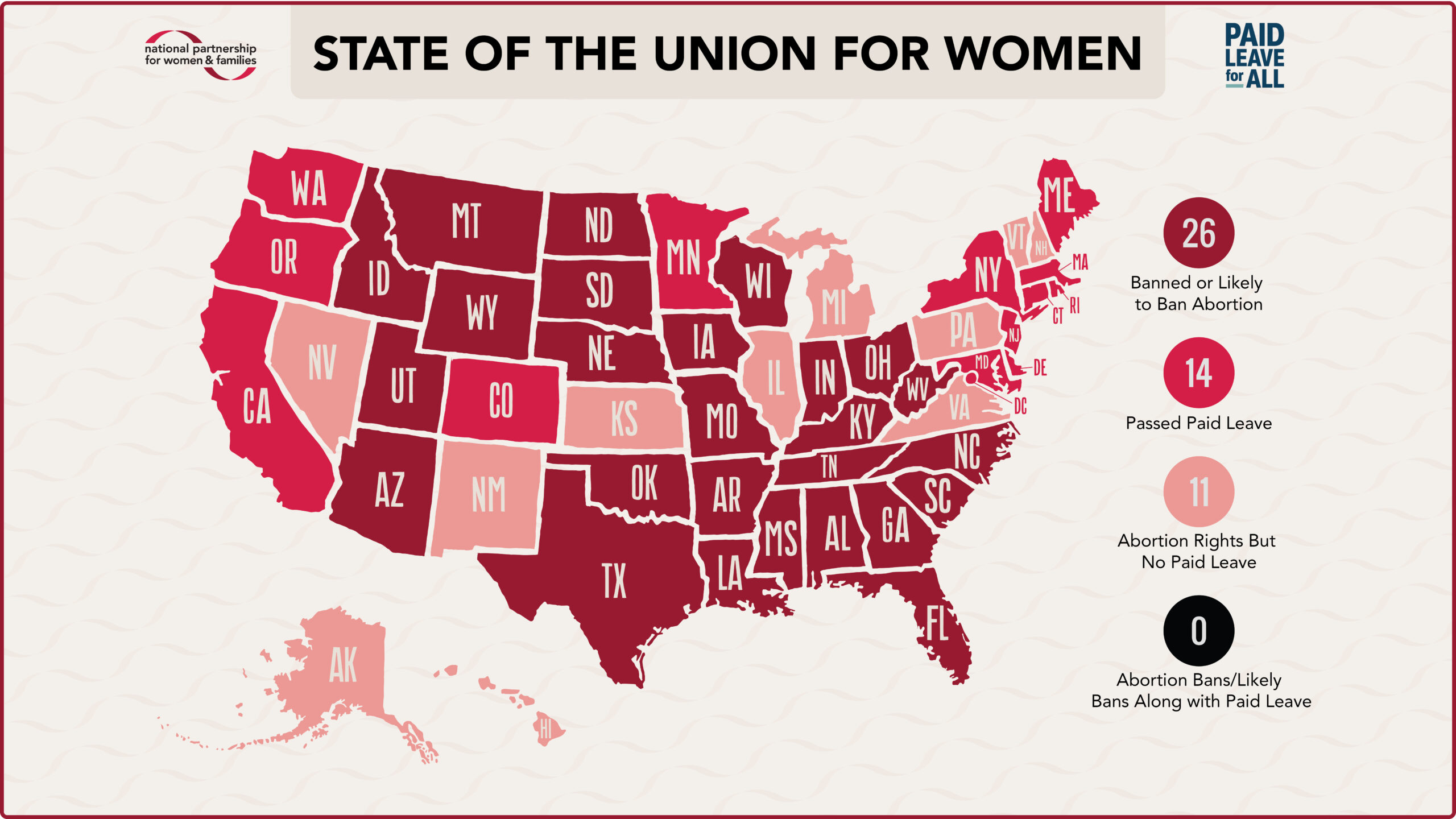WASHINGTON, D.C. – March 6, 2024 – Tomorrow, President Biden will deliver his State of the Union address in which he’ll highlight his agenda in a critical election year. The stakes are high for working families. President Biden will rightfully point to successes strengthening the economy and job market, investing in infrastructure and protecting unions. While our economy has rebounded since the COVID pandemic, the personal realities for many women and families are still challenged by navigating inequities at work, facing a persistent race and gender wage gap, affording child care, balancing caregiving, navigating restricted reproductive health access, facing a maternal health crisis, and finding quality affordable health care. And it’s these issues that women want to see important action on by the administration tomorrow, and in the months to come.
Reproductive Justice
In the wake of Dobbs, 26 states have banned or are likely to ban abortion. And the consequences of these bans are even greater for women of color and disabled people. Millions of people across the country are being threatened by these extreme abortion bans and the consequences they have for their health, families, and economic security. Since Roe v. Wade was overturned, abortion rights have been a driving motivator for voters and a winning issue in states across the country, election season after election season.
Voters know that anti-abortion extremists are not concerned with the wellbeing of their families. Of the states that have banned or are likely to ban abortion, none offer paid leave.
Meanwhile extremists are attacking reproductive health care on all fronts including birth control and IVF, and they’re working to limit access to quality affordable health care and hampering attempts to address the urgent maternal mortality crisis by disinvesting in the needs of underserved communities. We hope that President Biden uses his speech to talk about his administration’s continuing efforts to use the power of the Executive branch to protect the right to abortion access along with outlining the need to pass family-supporting policies that help women balance caregiving with a career.
Building an economy that works for all
When women are breadwinners of their households, restricted access to abortion and necessary reproductive health care can mean serious consequences for their financial security. On top of rising costs for everything from food to housing to child care, working women – and women of color especially – face persistent inequities in the job market. As we approach Equal Pay Day (March 12) women workers still make just 78 cents for every dollar that men make. This wage gap currently costs women more than $1.6 trillion each year and amounts to lost income that could be used to pay for months of rent, child care, groceries, and student loan payments.
And while unions saw major wins this year, many workers are still fighting for equity in the workplace, fair pay, and essential protections for pregnant workers. This includes the need for a comprehensive national paid leave program which has shown bipartisan momentum on Capitol Hill and with voters: polling shows that 85% of voters in battleground states favor paid parental, family and medical leave and nearly two-thirds of voters in battleground states reported being motivated to vote in elections next year by the creation of a paid family, parental, and medical leave program.
Supporting growing needs for working families
In the wake of the pandemic, President Biden made a strong commitment to support working families and to address the growing caregiving challenges they face. The child care industry is still in need of critical support to stabilize. Parents continue to face challenges finding quality affordable child care, and providers are struggling to invest in and retain staff and keep their doors open as operation costs rise. Because of the patchwork of paid leave access across the country, many working parents are forced to choose between caregiving or their paycheck. And as caregiving needs have grown not just for children, but for family members and loved ones outside of their home, women’s unpaid caregiving labor has become worth more than $625 billion each year.
Bottom line
The state of the union for women and families is that they are bearing the burden on multiple fronts: economic security, reproductive justice, and access to quality health care. Tomorrow and in the months to come, President Biden should continue to address the realities of women and working families. As we head closer to the November election, women voters want to know that President Biden will build an economy that works for everyone, especially women of color, and take every action to protect our rights.
# # #
Media Contact:
Miriam Cash
Email
202-986-2600


